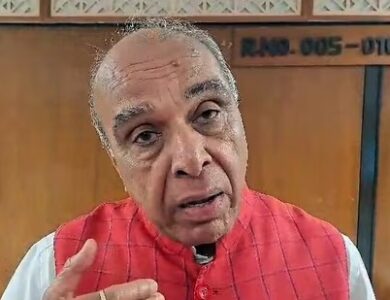
India mourns the passing of a stalwart in its political landscape, Buddhadeb Bhattacharjee, who left an indelible mark on the history of West Bengal. The former Chief Minister, who was instrumental in shaping the state’s socio-political fabric, breathed his last today, leaving behind a legacy that will be remembered for generations. As the nation reflects on his life and contributions, we delve into the key aspects of his remarkable journey.
1. Early Life and Political Beginnings
Buddhadeb Bhattacharjee was born on March 1, 1944, in Kolkata, West Bengal. He was drawn to politics early in life, influenced by the socio-political environment of post-independence India. His educational journey began at Sailendra Sircar Vidyalaya and continued at Presidency College, where he studied Bengali literature. It was here that his political inclinations began to take shape, as he became involved with the student movement and subsequently joined the Communist Party of India (Marxist), commonly known as CPI(M), in 1966.
His early political career was marked by his deep involvement in the cultural and literary circles of Kolkata. Bhattacharjee’s passion for Bengali literature and culture was evident in his work, and he was known for his intellectual prowess and deep understanding of the state’s socio-cultural dynamics. His entry into active politics was marked by his election to the West Bengal Legislative Assembly in 1977, representing the Jadavpur constituency—a seat he would go on to hold for several decades.
2. Rise to Power and Tenure as Chief Minister
Buddhadeb Bhattacharjee’s rise to prominence within the CPI(M) was steady and marked by his dedication to the party’s cause. He served in various capacities within the party and the state government, including as the Minister of Information and Cultural Affairs, where he played a crucial role in promoting Bengali cinema and arts. His tenure as the Minister of Home Affairs was notable for his efforts to maintain law and order during tumultuous times in West Bengal.
Bhattacharjee’s political acumen and leadership qualities were recognized by his party, leading to his appointment as the Chief Minister of West Bengal in 2000, following the resignation of Jyoti Basu. His tenure as Chief Minister was marked by a series of reforms aimed at modernizing the state’s economy and infrastructure. He championed industrialization and sought to attract investment to West Bengal, a move that was both lauded and criticized by various quarters.
Despite facing significant challenges, including resistance from within his own party and opposition from farmers and labor unions, Bhattacharjee remained steadfast in his vision for a more industrialized West Bengal. His efforts to bring in industries like Tata Motors to Singur and promote IT and software sectors were part of his broader agenda to create jobs and boost the state’s economy. However, these initiatives also led to controversies, particularly the land acquisition issues in Singur and Nandigram, which became significant political flashpoints during his tenure.
3. Controversies and Challenges
Buddhadeb Bhattacharjee’s tenure as Chief Minister was not without its share of controversies and challenges. The most significant among them were the land acquisition disputes in Singur and Nandigram, which became symbolic of the larger debate around development and industrialization in India. The government’s decision to acquire land in Singur for a Tata Motors factory led to widespread protests from farmers, who feared losing their livelihoods. The situation in Nandigram was even more severe, with violent clashes between the police and protestors, resulting in several deaths.
These incidents not only tarnished Bhattacharjee’s image but also led to a significant erosion of support for the CPI(M) in West Bengal. The opposition, led by the Trinamool Congress (TMC) under Mamata Banerjee, capitalized on these issues, portraying Bhattacharjee and his government as being out of touch with the concerns of the common people. The political fallout from these controversies played a significant role in the CPI(M)’s eventual defeat in the 2011 state assembly elections, ending their 34-year-long rule in West Bengal.
Despite these setbacks, Bhattacharjee remained committed to his ideals and continued to be an active voice in the political discourse of West Bengal. His writings and speeches reflected his deep concern for the state’s future and his unwavering belief in the principles of socialism and secularism.
4. Legacy and Impact
The passing of Buddhadeb Bhattacharjee marks the end of an era in West Bengal’s political history. His legacy is a complex one, marked by both achievements and controversies. On the one hand, he is remembered for his efforts to modernize West Bengal’s economy and his contributions to the state’s cultural and intellectual life. On the other hand, the controversies surrounding land acquisition and the subsequent electoral defeat of the CPI(M) during his tenure are seen as significant blemishes on his record.
However, it would be reductive to view Bhattacharjee’s legacy solely through the lens of these controversies. His commitment to the welfare of the people, his intellectual contributions, and his role in shaping the political landscape of West Bengal are undeniable. Bhattacharjee was a leader who sought to balance development with social justice, and his efforts to bring about economic progress while remaining true to his socialist ideals are noteworthy.
His impact on West Bengal’s cultural scene, particularly in the promotion of Bengali literature, cinema, and theater, is also a significant part of his legacy. Bhattacharjee was not just a politician but also a thinker and a writer, whose works continue to inspire many in the state. His deep love for Bengali culture and his efforts to preserve and promote it have left an indelible mark on the state’s cultural heritage.
Conclusion
Buddhadeb Bhattacharjee’s death is a profound loss for West Bengal and the nation as a whole. As the state mourns the passing of one of its most influential leaders, it is also a time to reflect on his contributions and the complex legacy he leaves behind. Bhattacharjee’s life was marked by a deep commitment to the people of West Bengal, and his efforts to balance economic development with social justice will be remembered as key aspects of his leadership.
While his tenure as Chief Minister was marked by both achievements and controversies, there is no denying that Buddhadeb Bhattacharjee played a pivotal role in shaping the state’s political and cultural landscape. His legacy will continue to influence the political discourse in West Bengal for years to come, as the state navigates the challenges of the future. The nation mourns the loss of a visionary leader, a thinker, and a man who dedicated his life to the service of his people.




